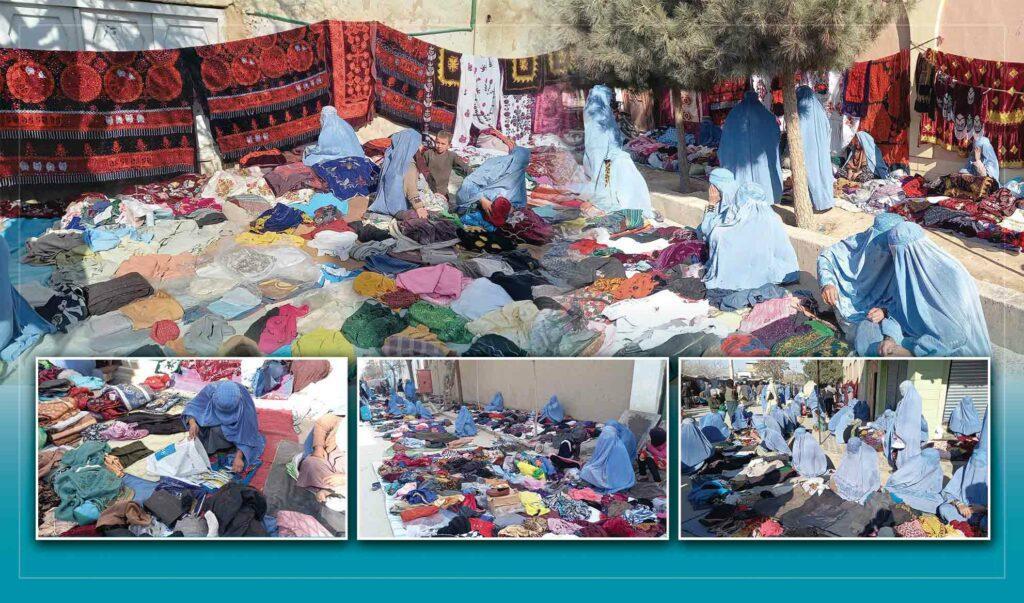
Female Venders: Trying To Survive Under The Weight Of Poverty
MAIMANA (Pajhwok): The number of women selling handicrafts in the crowded bazaar of Maimana city, the capital of Faryab province, has increased. These women say they sell handicrafts because they are the breadwinners of their families.
These women sellers, who sell goods on the streets of Maimana city under the hot sun in summer and in cold weather in winter, to earn a living for their families.
They complain about poverty and the lack of a market for their business. They say they support their families, but often go home empty-handed without selling anything.
Pictures taken by a Pajhwok Afghan News reporter at Maimana city's second-hand market show that the number of women selling handicrafts has increased compared to previous years.
Living under the weight of poverty and neglect
A widow named Halima, who has been selling old goods to support her four children for the past 16 years, says:“Recently, there have been more sellers and fewer buyers. Mostly, I go home empty-handed without selling anything. I can't even pay rent. I don't even earn 500 afghanis a month. In addition to selling old goods, I cook for people and wash their clothes to meet daily needs.”
Another woman Roshan, whose husband is addicted to drugs, is responsible to support her seven daughters. She brings people's old clothes and items to the market on Mondays and Thursdays to sell.
“I have been selling old things for eight years. Due to the lack of a specific place, I sometimes sit on the side of road under the snow, rain and scorching sun. We are asking the government to build us a suitable place.”
The woman said:“For many days I go home empty-handed without selling anything.”
She also noted the increase in female vendors and urged the authorities to build them a suitable shelter.
Sharifa, who has 30 years of experience in selling second hand goods, said her business has been booming in recent years due to the increase in the number of female vendors and the weakening of the people's economy.
“Previously, there were only a handful of women selling handicrafts, but now there are hundreds, and there is no work for everyone,” she says.
Aziza, who identifies herself as a resident of Qaisar district, says she lives in a rented house, her husband is an addict, and she is responsible t support 11 people in her family.
“I haven't been able to sell anything since 11 am today, when the market was open for four hours.”
She, who could not speak properly overcoming her grief, said the government should help and address the problems of homeless families, widows, and orphaned children.
On the other hand, Maimana Mayor Mufti Gul Ahmad Mubashir says that over the past forty years, many women in the country have become widows and orphans and lost their children and breadwinners, and are living in poverty and destitution. They are forced to sell goods to support themselves and their orphaned children.
Mubashir confirms that in recent years, the number of women selling on the streets of Maimana has increased, and the reason is the lack of a guardian and poverty.
He added:“Although women selling on the streets have not approached the municipality regarding the problem of space, we are trying to provide them with a suitable place that is protected from snow, rain, and sun and where they can carry out their activities peacefully.”
Similarly, Qari Naqibullah Hanafi, director of Faryab's Department of Industry and Commerce, said two groups of women operated in the second-hand market: the first group sells used and old clothes and the second group, although smaller in number, have joined small business or vocational training programs in recent years and now have their own products and sell them.
Hanafi added:“We cannot search for women vendors door to door. If they come to us, we try to introduce them to training programs or provide them with a suitable place with the advice of government leaders.”
However, women vendors in Maimana city are asking the government and responsible institutions to take practical and effective steps to improve their situation so that they can continue their work in a suitable and better environment. They want to be able to address problems of life under the government's protection and lead a dignified and peaceful life.
ma

Legal Disclaimer:
MENAFN provides the
information “as is” without warranty of any kind. We do not accept
any responsibility or liability for the accuracy, content, images,
videos, licenses, completeness, legality, or reliability of the information
contained in this article. If you have any complaints or copyright
issues related to this article, kindly contact the provider above.


















Comments
No comment